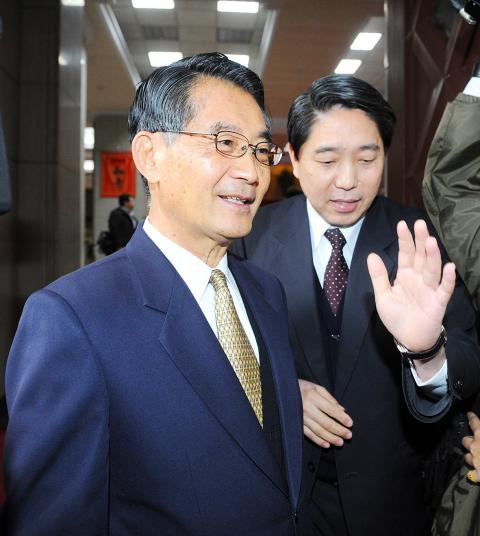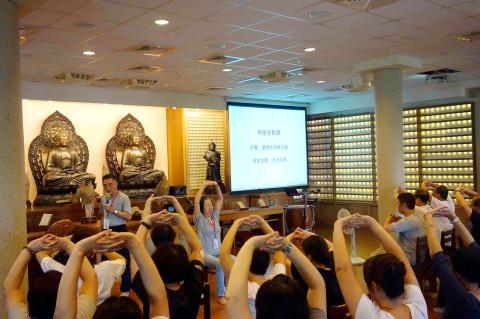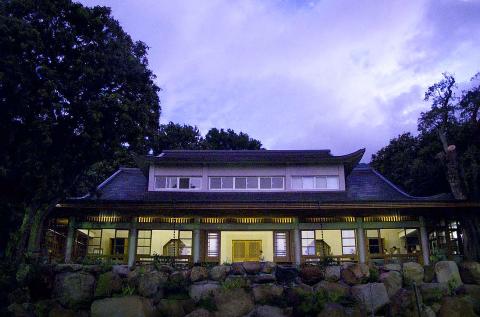Chen Wu-hsiung (陳武雄) says some people who attend his Zen Buddhist workshops are disappointed to learn that he’s not a monk. He’s not just any layperson, however, but the former minister for the Council of Agriculture from 2008 to 2012.
Chen doesn’t teach theology and formal meditation, preferring to leave that to the Buddhist clergy. Monks and nuns partner with him because of a program he developed to teach office-types how to relieve stress using methods that he’s cultivated over a 40-year career in public office. Chen applies mindfulness and other Zen principles in what he calls “Destressing Living Zen” (減壓生活禪).
Like most Zen retreats, cell phones are confiscated and talking is discouraged. However, participants will rarely find themselves sitting in a meditation hall. Instead they walk, eat, sip tea, listen to music, sweep, hike and watch movies, all while concentrating on the task at hand. Religion is rarely broached, the emphasis instead is placed on the person’s actions and their sense of themselves and their surroundings.

Photo: Wang Wei-min, Taipei Times
“Traditional retreats can provide deep knowledge and advanced understanding of Buddhism,” Chen says. “But the average person tends to revert to their default state of mind once they return to their daily lives. With Living Zen, you’re doing the same things in class as you would at home,” because in a sense the retreat is little different than the world participants leave behind.
FROM POLITICIAN TO TEACHER
After serving as deputy minister of agriculture during former Chinese Nationalist Party (KMT) president Lee Teng-hui’s (李登輝) final term, the new regime led by the Democratic Progressive Party (DPP) under former president Chen Shui-bian (陳水扁) moved Chen Wu-hsiung to a consultant position with the Executive Yuan in 2002. The position allowed for much more free time, and he began practicing Dharma Drum Mountain’s (法鼓山) Eight-Form Moving Meditation (八式動禪), which applies Zen principles and techniques to a set of simple physical exercises. This was the beginning of his study of Zen Buddhism.

Photo courtesy of Chan Grove Monastery
“We’re constantly moving in our daily lives, from the minute we wake up and walk to the bathroom to brush our teeth,” Chen says. “I thought, ‘How could I apply this ‘moving meditation’ to everyday activities?”
Despite decades of public service, Chen did not handle stress well, having suffered from insomnia since graduate school. He tended to overthink and had trouble focusing. When he was appointed minister for the Council of Agriculture in 2008, he needed a way to concentrate during the endless meetings and cope with natural disasters, which was part of his portfolio. He began each meeting by relaxing his body and concentrating on people’s words.
“Since I was relaxed, I was able to conserve energy to listen clearly, notice when I was confused and ask the proper follow-up questions,” he says. “My ability to make the right decision improved.”

Photo courtesy of Wikimedia Commons
After he stepped down in 2012, Chen began devising a stress-relieving system that used moving meditation and other Zen principles that could be taught to others.
When Master Guo Ru (果如法師) of Chan Grove Monastery learned about Chen’s endeavors, he invited him to supplement his retreats.
“Guo Ru thinks that what I’m doing fits the needs of modern people,” Chen says.
Chen says that serious practitioners — those who meditate for six or seven one-hour periods a day for seven days — look down on his methods.
“They may be right, but realistically, how many seven-day meditation retreats can one attend in a lifetime?” Chen asks. “With Living Zen, we’re effectively meditating every day.”
OBSERVE THE MOMENT, CONTROL EMOTIONS
At his retreats, Chen guides participants in observing their body and senses through mundane activities, which ultimately is meant to give a person more emotional awareness.
These principles are applied throughout the workshop. When drinking tea, the participants feel the warmth of the cup in their hands, observe the leaves expand while paying attention to the sound of wind chimes and birds coming from outside. When eating, Chen tells participants to savor each bite and be fully aware how chewing breaks down the ingredients into mush.
“Don’t try to resist your inner thoughts,” he says. “Focus your mind on your body. If you’re immersed in how the food tastes, for example, there isn’t room for unnecessary thoughts.”
These observation skills can then be applied to one’s emotions, Chen says. The quicker a person realizes that they are getting angry, the quicker they can calm down.
“If your observation skills aren’t attuned, you won’t be aware that you’re getting mad. Then you yell and curse at people and regret it later. One should realize the moment they’re getting angry or feeling other emotions. That’s inner wisdom.”
Finally, Chen says that in a modern context, living in the moment doesn’t mean that people should live life day-to-day without goals. But they should try to avoid being pressured by these goals and their time constraints.
“You set a goal, make a plan and you execute the plan. But when you’re executing the plan, you don’t become preoccupied with the goal. You put 100 percent effort into the moment, and when your anxieties and worries have disappeared, only then will you reach your full efficiency.”
Chen is now training Living Zen instructors at Chan Grove (祖師禪林) monastery, hoping to further promote this type of Zen for the modern, stressed out person.
For more information about the retreats, visit: www.changroveweb.org.

In the March 9 edition of the Taipei Times a piece by Ninon Godefroy ran with the headine “The quiet, gentle rhythm of Taiwan.” It started with the line “Taiwan is a small, humble place. There is no Eiffel Tower, no pyramids — no singular attraction that draws the world’s attention.” I laughed out loud at that. This was out of no disrespect for the author or the piece, which made some interesting analogies and good points about how both Din Tai Fung’s and Taiwan Semiconductor Manufacturing Co’s (TSMC, 台積電) meticulous attention to detail and quality are not quite up to

April 21 to April 27 Hsieh Er’s (謝娥) political fortunes were rising fast after she got out of jail and joined the Chinese Nationalist Party (KMT) in December 1945. Not only did she hold key positions in various committees, she was elected the only woman on the Taipei City Council and headed to Nanjing in 1946 as the sole Taiwanese female representative to the National Constituent Assembly. With the support of first lady Soong May-ling (宋美齡), she started the Taipei Women’s Association and Taiwan Provincial Women’s Association, where she

Chinese Nationalist Party (KMT) Chairman Eric Chu (朱立倫) hatched a bold plan to charge forward and seize the initiative when he held a protest in front of the Taipei City Prosecutors’ Office. Though risky, because illegal, its success would help tackle at least six problems facing both himself and the KMT. What he did not see coming was Taipei Mayor Chiang Wan-an (將萬安) tripping him up out of the gate. In spite of Chu being the most consequential and successful KMT chairman since the early 2010s — arguably saving the party from financial ruin and restoring its electoral viability —

It is one of the more remarkable facts of Taiwan history that it was never occupied or claimed by any of the numerous kingdoms of southern China — Han or otherwise — that lay just across the water from it. None of their brilliant ministers ever discovered that Taiwan was a “core interest” of the state whose annexation was “inevitable.” As Paul Kua notes in an excellent monograph laying out how the Portuguese gave Taiwan the name “Formosa,” the first Europeans to express an interest in occupying Taiwan were the Spanish. Tonio Andrade in his seminal work, How Taiwan Became Chinese,